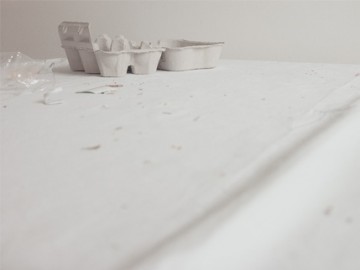Erika Babatz
VANITAS DER ENTSORGUNG
March 7, 2009 – April 25, 2009
Appropriate for the Ehegraben, which was used a garbage disposal, the series of Babatz picks on themes such as garbage, disposal and mortality.
Still lives are described in the history of European art tradition as arrangements of discrete depiction of usually lifeless objects whose selection and arrangement follows in form and content aesthetic aspects.
The vanitas still life is a particular form that combines a perfect painted arrangement of apparently any object with a netting of symbols that circle around the idea of vanitas. These symbols or allegories of mortality were commonly used in their times.
Vanitas (lat. appearance, nothingness, vanity) used to stand for the mortality of all flesh. As mentioned in the book of Kohelet in the Old Testament (Koh.1,2): ’Vanitas vanitatum et omnia vanitas’ – ’Vanity of vanity, all is vanity’. Martin Luther translates ’vanity’ in its original meaning as ’nothingness’.
Babatz pursuits in this particular work that special kind of description. By taking different used items that are on their way of being eternally disposed and recycled Babatz tries to create pictures that transport another meaning: The hint to one’s own nothingness remains today, as in the baroque era, a justification strategy for human work and its cost and demand that needs to be protected from criticism. Warnings justify the pleasures. This antagonism explains the baroque antithetic, which is full of contradictions and that, has formed the work of Babatz.
This work is an attempt to debate on history of arts, on photography and on the lamentation of mortality that is a current topos since the ancient world: Plato/Heraclites' ’Panta rhei’ – everything is in a state of flux’ and Hippocrates/Seneca’s ’Vita brevis, ars longa – Life is short, the art long’.
Still lives are described in the history of European art tradition as arrangements of discrete depiction of usually lifeless objects whose selection and arrangement follows in form and content aesthetic aspects.
The vanitas still life is a particular form that combines a perfect painted arrangement of apparently any object with a netting of symbols that circle around the idea of vanitas. These symbols or allegories of mortality were commonly used in their times.
Vanitas (lat. appearance, nothingness, vanity) used to stand for the mortality of all flesh. As mentioned in the book of Kohelet in the Old Testament (Koh.1,2): ’Vanitas vanitatum et omnia vanitas’ – ’Vanity of vanity, all is vanity’. Martin Luther translates ’vanity’ in its original meaning as ’nothingness’.
Babatz pursuits in this particular work that special kind of description. By taking different used items that are on their way of being eternally disposed and recycled Babatz tries to create pictures that transport another meaning: The hint to one’s own nothingness remains today, as in the baroque era, a justification strategy for human work and its cost and demand that needs to be protected from criticism. Warnings justify the pleasures. This antagonism explains the baroque antithetic, which is full of contradictions and that, has formed the work of Babatz.
This work is an attempt to debate on history of arts, on photography and on the lamentation of mortality that is a current topos since the ancient world: Plato/Heraclites' ’Panta rhei’ – everything is in a state of flux’ and Hippocrates/Seneca’s ’Vita brevis, ars longa – Life is short, the art long’.

